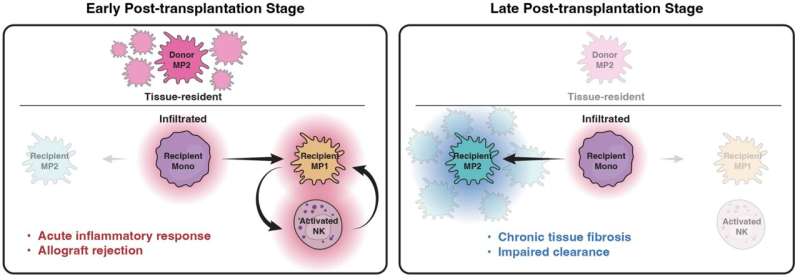
Credit: Dr. Xiao Li
Pediatric heart transplantation has long been hailed as a life-saving intervention for children suffering from end-stage heart failure. While the procedure offers hope, the long-term outcomes for these young patients remain suboptimal due to allograft rejection and graft failure.
In a new study, researchers from The Texas Heart Institute, Baylor College of Medicine, Texas Children’s Hospital, and the University of Texas Health Science Center McGovern Medical School have shed light on the underlying molecular cell states within transplanted pediatric hearts, paving the way for improved treatment strategies and enhancing the longevity of cardiac allografts.
The research is published in the journal Circulation.
The research, led by physician-scientist at The Texas Heart Institute (THI) Dr. James F. Martin, Vivian L. Smith Chair in Regenerative Medicine and Vice Chairman and Professor of Integrative Physiology at Baylor College of Medicine, single-cell genomics expert Dr. Xiao Li, THI Faculty and Assistant Investigator of the McGill Gene Editing Lab at THI and Dr. Diwakar Turaga, pediatric cardiac intensivist at Texas Children’s Hospital and assistant professor of pediatrics—critical care at Baylor College of Medicine, utilized a unique dataset comprising rare heart samples from repeat heart transplantations. By harnessing cutting-edge single-nucleus RNA sequencing (snRNA-seq) techniques, the researchers could delve deep into the inflammatory myocardial microenvironment within human pediatric cardiac allografts.
“Our approach offers an unprecedented level of detail,” said Dr. Martin. “We were able to distinguish immune cells originating from the donor versus the recipient by leveraging naturally occurring genetic variants embedded within our sequencing data. This helps us gain a comprehensive understanding of the immune response dynamics within transplanted hearts.”

Credit: Dr. Xiao Li
The study, which marks the first-ever description of molecular cell states within a transplanted pediatric heart at single-cell resolution, examined samples collected as early as 5 days post-transplantation and extending up to 12 years thereafter. Through meticulous analysis, the researchers discovered a rapid loss of donor-derived tissue-resident macrophages, which are crucial for graft acceptance and long-term success. In contrast, macrophages derived from the recipient’s circulation swiftly populated the heart shortly after transplantation. This imbalance between donor-derived and recipient-derived macrophages significantly contributed to allograft failure.
“These findings have significant clinical implications,” explained Dr. Li. “By targeting the heightened inflammatory response mediated by recipient-derived macrophages and natural killer cells, we can potentially prevent early graft failure and acute rejection episodes. Additionally, preserving the population of resident macrophages within the transplanted heart could pave the way for novel immunomodulation strategies and greatly enhance the longevity of pediatric cardiac allografts.”
The research is a collaborative effort between leading medical institutions. Dr. Turaga added, “In the CICU, I take care of children who come in with heart rejection. Our medical therapies to treat rejection are still very limited. This study is a major step towards targeted immune therapies and precision medicine.”
Together, the team’s collective efforts have advanced our understanding of immune response dynamics in transplanted pediatric hearts, opening new avenues for more targeted and effective post-transplantation rejection management.
This study represents a major step forward in pediatric heart transplantation and highlights the power of cutting-edge genomic tools in unraveling the pathophysiology of allograft dysfunction. With further research and clinical implementation, these insights hold the potential to transform the lives of young patients and improve their long-term quality and quantity of life.
More information:
Xiao Li et al, The Macrophage Landscape Across the Lifespan of a Human Cardiac Allograft, Circulation (2024). DOI: 10.1161/CIRCULATIONAHA.123.065294
Provided by
Texas Heart Institute
Citation:
Genomic study sheds light on immune microenvironment in transplanted pediatric hearts (2024, February 12)
retrieved 16 April 2024
from https://medicalxpress.com/news/2024-02-genomic-immune-microenvironment-transplanted-pediatric.html
This document is subject to copyright. Apart from any fair dealing for the purpose of private study or research, no
part may be reproduced without the written permission. The content is provided for information purposes only.
Note: This article have been indexed to our site. We do not claim legitimacy, ownership or copyright of any of the content above. To see the article at original source Click Here













